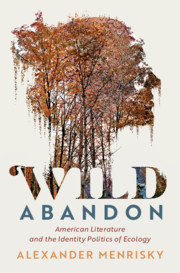
-
Select format
-
- Publisher:
- Cambridge University Press
- Publication date:
- 26 November 2020
- 17 December 2020
- ISBN:
- 9781108909952
- 9781108842563
- 9781108829458
- Dimensions:
- (229 x 152 mm)
- Weight & Pages:
- 0.55kg, 266 Pages
- Dimensions:
- (229 x 152 mm)
- Weight & Pages:
- 0.436kg, 266 Pages
- Series:
- Cambridge Studies in American Literature and Culture (185)
- Subjects:
- Literature, Area Studies, American Literature, American Studies, Literary Theory
You may already have access via personal or institutional login- Series:
- Cambridge Studies in American Literature and Culture (185)
- Subjects:
- Literature, Area Studies, American Literature, American Studies, Literary Theory
Book description
The American wilderness narrative, which divides nature from culture, has remained remarkably persistent despite the rise of ecological science, which emphasizes interconnection between these spheres. Wild Abandon considers how ecology's interaction with radical politics of authenticity in the twentieth century has kept that narrative alive in altered form. As ecology gained political momentum in the 1960s and 1970s, many environmentalists combined it with ideas borrowed from psychoanalysis and a variety of identity-based social movements. The result was an identity politics of ecology that framed ecology itself as an authentic identity position repressed by cultural forms, including social differences and even selfhood. Through readings of texts by Edward Abbey, Simon Ortiz, Toni Morrison, Margaret Atwood, and Jon Krakauer, among others, Alexander Menrisky argues that writers have both dramatized and critiqued this tendency, in the process undermining the concept of authenticity altogether and granting insight into alternative histories of identity and environment.
Contents
Metrics
Altmetric attention score
Full text views
Full text views help Loading metrics...
Loading metrics...
* Views captured on Cambridge Core between #date#. This data will be updated every 24 hours.
Usage data cannot currently be displayed.
Accessibility standard: Unknown
Why this information is here
This section outlines the accessibility features of this content - including support for screen readers, full keyboard navigation and high-contrast display options. This may not be relevant for you.
Accessibility Information
Accessibility compliance for the PDF of this book is currently unknown and may be updated in the future.

